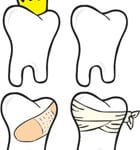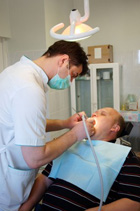 Once upon a time in a land known as the city of Leeds, there once lived an evil dentist that used to prey on patients that were suffering from bad tooth decay and if you found yourself in the chair, this dentist would cruelly drill and splice, sometimes twice, until the you suffered from severe pain- which goes a long way to explaining just why it is that people still have reservations and fears about the nature of root canal treatment. You see, when this treatment first began to be practiced, it was very raw- yes the science behind it was faultless, but the tools however were a little flawed, drills and scalpels, and seeing as the roots can grow twisted and turned, removing them after decay had infected the tooth could be quite complex; in some extreme cases, the dentist would have to slice through the gums and come in from the side. This meant that the whole operation was painful and uncomfortable. However, there is a ‘happy ever after’ scenario to this bad fairytale; science and technology has caught up with the theory behind this treatment and now lasers have replaced the original tools of torture. In seconds the infected pulp and roots can be cleared out painlessly allowing the tooth to be refilled and thus, saving it altogether…..the end!
Once upon a time in a land known as the city of Leeds, there once lived an evil dentist that used to prey on patients that were suffering from bad tooth decay and if you found yourself in the chair, this dentist would cruelly drill and splice, sometimes twice, until the you suffered from severe pain- which goes a long way to explaining just why it is that people still have reservations and fears about the nature of root canal treatment. You see, when this treatment first began to be practiced, it was very raw- yes the science behind it was faultless, but the tools however were a little flawed, drills and scalpels, and seeing as the roots can grow twisted and turned, removing them after decay had infected the tooth could be quite complex; in some extreme cases, the dentist would have to slice through the gums and come in from the side. This meant that the whole operation was painful and uncomfortable. However, there is a ‘happy ever after’ scenario to this bad fairytale; science and technology has caught up with the theory behind this treatment and now lasers have replaced the original tools of torture. In seconds the infected pulp and roots can be cleared out painlessly allowing the tooth to be refilled and thus, saving it altogether…..the end!











 Your dentist in the City of Leeds will be able to diagnose your abscessed tooth with a quick examination with a dental instrument. X-rays may also be needed to determine whether or not the infection has eroded the surrounding bone. With a proper diagnosis, your dentist can begin to treat your abscessed tooth straight away.
Your dentist in the City of Leeds will be able to diagnose your abscessed tooth with a quick examination with a dental instrument. X-rays may also be needed to determine whether or not the infection has eroded the surrounding bone. With a proper diagnosis, your dentist can begin to treat your abscessed tooth straight away. The words root and canal do not sit easy on the mind when you apply both of them dental work. In fact, it sounds utterly torturous and if you look up the word torture, you will find the word pain thrown in there too somewhere. In the city of Leeds, there are a lot of urban myths built up around root canal treatment. Not so much is said however, about how we turned a blind eye to oral hygiene and kept cancelling check-ups, which kicked off the problem in the first place. The reason for having this treatment is to remove decay that has set in, so that the tooth can be saved. Maybe the myths that surround this procedure are due to the nature of the work required, well, just sounding bad. Here we go…..the decay first has to be removed under a local anaesthetic by scraping out all the dead pulp inside the tooth and then treated with an anti-fungal fluid. Now, the roots have to be drilled out. This can be complex and on occasions, the dentist may have to come through the gum and enter the tooth from the side, then the tooth is filled and capped…..does that sound bad now?! In all reality, it’s a fairly easy procedure that is no more painful than a filling and generally the tooth is good for at least another 10 years. If you still feel concerned, then maybe you should look after your teeth more, because after all, you don’t wanna go through that nightmare again, do you?
The words root and canal do not sit easy on the mind when you apply both of them dental work. In fact, it sounds utterly torturous and if you look up the word torture, you will find the word pain thrown in there too somewhere. In the city of Leeds, there are a lot of urban myths built up around root canal treatment. Not so much is said however, about how we turned a blind eye to oral hygiene and kept cancelling check-ups, which kicked off the problem in the first place. The reason for having this treatment is to remove decay that has set in, so that the tooth can be saved. Maybe the myths that surround this procedure are due to the nature of the work required, well, just sounding bad. Here we go…..the decay first has to be removed under a local anaesthetic by scraping out all the dead pulp inside the tooth and then treated with an anti-fungal fluid. Now, the roots have to be drilled out. This can be complex and on occasions, the dentist may have to come through the gum and enter the tooth from the side, then the tooth is filled and capped…..does that sound bad now?! In all reality, it’s a fairly easy procedure that is no more painful than a filling and generally the tooth is good for at least another 10 years. If you still feel concerned, then maybe you should look after your teeth more, because after all, you don’t wanna go through that nightmare again, do you? Root canal treatment is a common and vital procedure necessary to restore the health of a tooth that has become damaged internally. Inside all of your teeth is a chamber, known as the pulp chamber. In this chamber there are many, nerves, arteries, veins and tissues. Entering into the pulp chamber through the root are the root canals which carry nerves into the tooth.
Root canal treatment is a common and vital procedure necessary to restore the health of a tooth that has become damaged internally. Inside all of your teeth is a chamber, known as the pulp chamber. In this chamber there are many, nerves, arteries, veins and tissues. Entering into the pulp chamber through the root are the root canals which carry nerves into the tooth.

